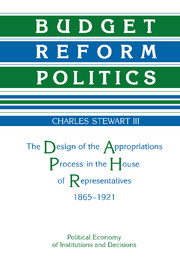 Budget Reform Politics
Budget Reform Politics Book contents
- Frontmatter
- Contents
- List of tables and figures
- Series editors' preface
- Acknowledgments
- PART I ISSUES IN THE STUDY OF BUDGETING
- PART II SPENDING REFORM AND ITS CONSEQUENCES, 1865–1921
- Introduction
- 3 The politics of budgetary structure, 1865–1885
- 4 Adaptation and adjustment to decentralization: post-1885 spending decisions
- 5 The reappearance of formal reform, 1885–1921
- PART III CONCLUSION
- Appendix: summary of budget reform attempts in the House, 1865–1921
- References
- Index
- Frontmatter
- Contents
- List of tables and figures
- Series editors' preface
- Acknowledgments
- PART I ISSUES IN THE STUDY OF BUDGETING
- PART II SPENDING REFORM AND ITS CONSEQUENCES, 1865–1921
- Introduction
- 3 The politics of budgetary structure, 1865–1885
- 4 Adaptation and adjustment to decentralization: post-1885 spending decisions
- 5 The reappearance of formal reform, 1885–1921
- PART III CONCLUSION
- Appendix: summary of budget reform attempts in the House, 1865–1921
- References
- Index
Summary
For those overwhelmed with the dimensions of the federal budget in the 1980s, budgeting in the sixty years after the Civil War must seem idyllic. In these present days of deficits denominated in the hundreds of billions of dollars; myriad committees with various powers over budget authority, outlays, and entitlement authorization; and great debates over the mix of fiscal policy instruments, the nineteenth century seems like placid waters. In the late-nineteenth and early-twentieth centuries deficits were denominated in the hundreds of thousands of dollars, with $100 million surpluses common. Before the Civil War, jurisdiction over both spending and taxing was consolidated in only one committee in each chamber. Even when appropriations jurisdictions were parceled out among seven House committees after 1885, the numerous centers of budgetary power were at least well-identified and were controllable by party leaders. And in a pre-Keynesian world, government just did not worry about fiscal policy, only about budget policy (Kimmel 1959).
Yet to paint a picture of utter serenity would be grossly misleading. By today's standards budgeting between 1865 and 1921 was simple and manageable, but seen at its own scale, and examined at a closer level, budgeting was quite contentious. For, no less than today, the federal budget stood as the best symbol delineating who were the government's winners and losers. By modern comparison the size of federal spending was small; but what little there was, was fought over fiercely.
- Type
- Chapter
- Information
- Budget Reform PoliticsThe Design of the Appropriations Process in the House of Representatives, 1865–1921, pp. 77 - 78Publisher: Cambridge University PressPrint publication year: 1989


